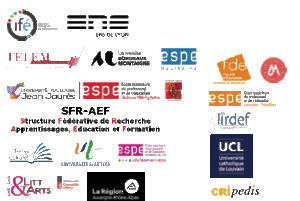PELAS study day: Analytical approaches to literature in secondary schools as curricula are renewed

The first PELAS study day will take place at ENS/IFÉ in Lyon on October 19, 2017.
It is organized in collaboration with the ÉSPÉs of the academies of Bordeaux-Aquitaine, Grenoble-Alpes, Languedoc-Roussillon, Lille-Nord de France, Midi-Pyrénées, Versailles / Université catholique de Louvain / IFÉ/ENS LYON / Laboratoires CRIPEDIS, LIRDEF, LITEXTRA (LITT&Arts), LLA-CREATIS, TEXTES ET CULTURES, TELEM
Getting to ENS/IFÉ in Lyon :
[gdlr_divider type="solid " size="50% " ]
STUDY DAY :
THURSDAY, OCTOBER 19, 2017 (10am-5pm)
ENS/IFÉ LYON
Analytical approaches to literature in secondary schools
as curricula are renewed
as curricula are renewed
[gdlr_divider type="solid " size="50% " ]
For almost two decades, the field of research into the didactics of literature has been developing dynamically, constructing or reconfiguring notions and concepts (subject reader, reader's text, literary reading) and carving out (seeking) a place for itself in the fields of literary studies and the didactics of French. As Annie Rouxel reminded us in 2006 at the inaugural session of an inter-university seminar (Mazauric, Fourtanier, Langlade, 2011:19-20):
Our research on literary reading is characterized, at the theoretical level, by a paradigm shift: by a shift from a conception of literary reading inscribed in a theory of the text, which postulates the implicit or virtual reader (in other words, from the perspective of reception theorists), to a conception of literary reading that is interested in the reconfiguration of the text by the actual reader and presents plural modes of realization. So there's a shift in focus: from the virtual reader to the real reader, and consequently from the "text of the work" to the "text of the reader".
But what exactly is the impact of this "research into literary reading" on the everyday life of secondary school classes, particularly with the implementation of new programs in collèges in France and in qualifying classes in Belgium on the one hand, and the use of digital resources and tools on the other?
Research conducted in the field of literature didactics seems to influence institutional choices, relayed in particular in France by the Inspection (générale) and in Belgium by official instructions. The fact remains that, for reasons linked to its emergence, the conditions of its constitution and the complexity of its subject (Ahr, 2015), this field of research has so far privileged "the speculative (or epistemological, if you like) dimension [...] over the praxeological dimension" (Daunay & Dufays, 2007: 12). However, "didactic development cannot do without reflection on the reality of practices" (Chanfrault-Duchet, 2001: 115), which cannot be reduced to innovative practices or those of novice teachers. We therefore need to question the conditions under which analytical approaches to literature are actually implemented in the classroom, and thus "confront concepts with actual practices [because] we can only act on a situation if we know it, since theory only makes sense when linked to facts" (Dufays, 2006: 79).
The notions and concepts of subject reader, reader's text and literary reading have been introduced into the classroom, particularly in connection with the cursive reading of literary works. To date, however, it is difficult to measure the impact of the shift in the scientific paradigm underlying these notions and concepts on the renewal of analytical approaches to literature in secondary schools, and their effects on the learning actually achieved by students. This is why the PELAS team (Pratiques Effectives de Lectures Analytiques dans le Secondaire) has launched a five-year research program (2014-2019) on this didactic object, whose contours and specificities remain to be identified, particularly from a curricular perspective. Comparing results obtained in French classes with those gathered in Belgian classes, where the analytical approach to literature is not based on exactly the same school exercises, should facilitate this identification.
The PELAS team invites all those involved in the teaching of literature in secondary schools to pool their thoughts and experiences in relation to analytical approaches to literature. The aim of the day will be to bring to light the many questions raised by the possible renewal of these approaches. The study day will also examine the efficiency of the methodological tools developed to process the data collected (audiovisual recordings of class sessions, semi-structured interviews with students and teachers, written work, etc.). The results of the collective reflection thus undertaken will again be debated at the colloquium "Approches analytiques de la littérature dans le secondaire: un objet scolaire et didactique à identifier", which the PELAS team will organize on October 18 and 19, 2018, also at the ENS/IFÉ in Lyon.
In order to encourage a cross-fertilization of views on actual practices in the analytical approach to literature, discussions will focus on the following areas:
- Current programs in France and Belgium from a research point of view: the challenges of renewal and the obstacles, assumed and/or observed, to their implementation.
- Continuities and ruptures in effective practices for teaching the reading of literature at different levels of schooling.
- Analysis of actual practices: issues and methods for processing data collected in the classroom.
Bibliography
AHR, S. (2015), Enseigner la littérature aujourd'hui : " disputes " françaises, Paris, Honoré Champion, coll. " Didactique des lettres et des cultures ".
CHANFRAULT-DUCHET, M.-F. (2001), "Didactique de la littérature : aborder l'analyse des pratiques", in Recherches en didactique de la littérature, M.-J. Fourtanier, G. Langlade, A. Rouxel (coord.), Rennes, Presses Universitaires de Rennes, 2001, p. 115-122.
DAUNAY, B. and DUFAYS, J.-L. (2007), "Méthodes de recherche en didactique de la littérature", in La lettre de l'AIRDF, n° 40, Villeneuve d'Ascq, p. 8-13.
DUFAYS, J.-L. (2006), " La lecture littéraire, des "pratiques du terrain" aux modèles théoriques ", in Lidil, n° 33, Grenoble, Ellug, p. 79-101.
MAZAURIC, C., FOURTANIER, M.-J. & LANGLADE, G. (dir.) (2011), Le texte du lecteur, Bruxelles, Peter Lang, coll. ThéoCrit, vol. 2, p. 19-25.
PELAS team
Ahr Sylviane, Bazile Sandrine, Boutevin Christine, Brunel Magali, Cahen Françoise, Couteaux Cécile, De Croix Séverine, De Peretti Isabelle, Dufays Jean-Louis, Le Goff François, Moinard Pierre, Perrin-Doucey Agnès, Plissonneau Gersende